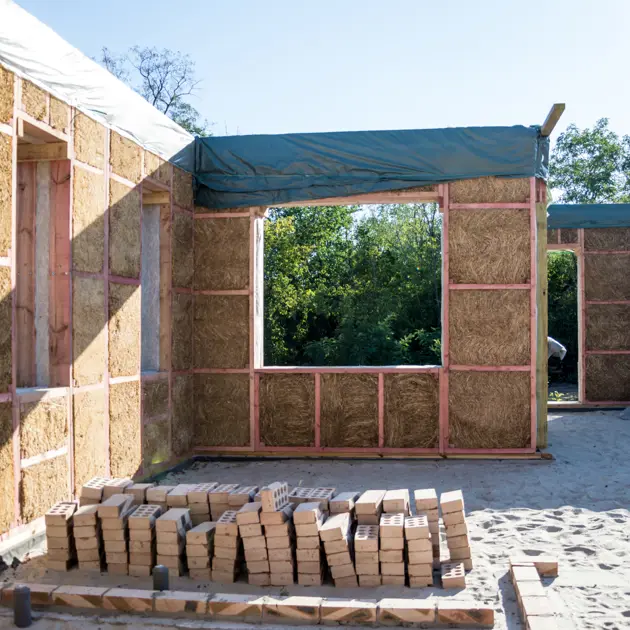Laudes Foundation seeks proposals from organisations working to deploy effective accountability tactics towards construction clients in key European markets
Laudes Foundation seeks proposals from organisations working to deploy effective accountability tactics towards construction clients1 in the key European markets of France, Germany, Netherlands, Spain, Poland and/or United Kingdom (consideration will also be given to proposals covering Czechia, Denmark, Ireland and/or Italy).
An effective accountability system is critical to ensure robust, ambitious climate action and a just transition. While we have mapped a range of accountability tactics that have proven effective in other sectors, we now seek proposals for how these could be meaningfully deployed in key markets using national laws and frameworks through partnerships and collaborations. Complete proposals must be submitted to Richard Boyd (r.boyd@laudesfoundation.org) by 20 September. More details are given below in the request for proposals.
Introduction
At Laudes Foundation, we are addressing the defining challenges of our time: climate change, nature loss and social inequality. We are driven by the belief that businesses, when guided by values, rules and incentives, can be powerful agents for positive change. Our approach combines the catalytic power of philanthropy to work with and through business and industry to advance system change. Gender Equity and Social Inclusion (GESI) is a cornerstone of our mission to accelerate the transition to a green, fair and inclusive economy.
Tackling systemic challenges requires a multifaceted approach. We focus on driving a just transition in four key industries with outsized impact on climate change, nature loss and inequality: built environment, finance and capital markets, fashion and food. Across these industries, we have cross-cutting programmes in labour rights and narratives, and support initiatives to unlock capital for transitions across all industries.
This Request for Proposals (RFP) comes from Laudes Foundation’s Built Environment programme. Our intention with this RFP is to build the field of actors and programmes holding influential construction clients accountable for delivering climate action and ensuring a just transition at the national level.
Laudes Foundation is specifically looking for organisations capable of challenging industry in key national markets to increase performance across built environment just transition initiatives by deploying accountability tactics using national policies and frameworks.
Context
What do we mean by accountability?
Laudes Foundation supports policies, pathways and accountability mechanisms to hold our key actors of focus - policymakers, business, investors and finance, media - accountable for enabling and accelerating a just transition.
Effective accountability mechanisms ensure that those impacted have agency and inclusion to influence expectations (e.g. for policy), monitor performance against commitments and requirements, and can challenge laggards for inaction. When accountability mechanisms function, trust and credibility can be enhanced amongst interested parties (e.g. employees/workers, business partners or consumers).
There is a substantial body of existing work on accountability both in the built environment and in other sectors2. On behalf of Laudes, the Autonomy Institute has reviewed the effectiveness of various accountability tactics, and their applicability to this sector – a link to their report, Laying the Groundwork, is available here.
The focus of this RFP, therefore, is to build on the foundational work by Autonomy, World Benchmarking Alliance and others, to hold industry accountable for delivering just transitions (i.e. the intersection of decarbonisation actions and ensuring this is just for affected workers and/or residents and their communities) in key national markets.
Who are we holding accountable?
We are choosing to initially focus on what we see is the most influential node in the value chain: construction clients in key national markets3. We define construction clients as any entity procuring construction services (new build or renovation) and thereby holding responsibility for two key issues: a project’s business model, and a project’s brief. These responsibilities give construction clients the power to determine the climate performance of a project and its impact on vulnerable communities (e.g. the structural material choice, demolition vs. retention of existing buildings, consequences for local residents, and so on). We have chosen to use the term construction clients (rather than ‘developers’) to ensure that both private and public4 sector organisations are captured. As such, construction clients can be organised into three groups based on ownership and funding:
- Public sector: Publicly-owned, publicly-funded
- Private sector: Publicly-listed, privately-financed
- Private sector: Non-listed, privately financed
Market data, policy and accountability tactics
Significant parts of the real estate ecosystem are at risk of falling through the cracks of existing accountability efforts, in part because:
- Current voluntary action programmes in industry typically have relatively under-developed accountability and enforcement mechanisms, which if fully-developed could ensure commitments result in significant action and/or deployment of significant capital;
- Membership-based accountability groups only cover those organisations willing to pay-to-play, thus those companies which chose not to participate are not held accountable to action; and
- The European Union’s, Corporate Sustainability Due Diligence Directive (CSDDD), has thresholds set too high to cover many construction clients who, despite their size, have a significant influence on the sector (further information can be found in the Annex to this RFP).
- Philanthropically-funded civil society accountability work has to date focused on accountability of the largest companies, typically those which are publicly listed. For example, the World Benchmarking Alliance is targeting the largest 2,000 multinationals. For their Buildings benchmark they found only 50 of the 2,000 (2.5%) had a significant real estate role, of those only seven were headquartered in Europe, and only some were construction clients. Large reporting initiatives such as CDP have also focused on this large corporate space, meaning a large number of smaller construction clients are not challenged by accountability work based on those reporting initiatives.
To contribute to filling these gaps, the Laudes Foundation is structuring our work on accountability into 3 pillars:

Further information on the first and second pillars can be found in the Annex. The focus in this RFP is meant to complement and energize these other areas of work by focusing on the third pillar; national level tactics and their deployment in key markets.
Purpose and scope
Laudes Foundation is specifically looking for organisations capable of challenging industry in key national markets to increased performance across built environment just transition initiatives by deploying accountability tactics using national policies and frameworks.
The key markets of focus are: France, Germany, Netherlands, Spain, Poland and/or United Kingdom (consideration will also be given to proposals covering Czechia, Denmark, Ireland and/or Italy).
Accountability tactics should be tightly targeted to construction clients across public, private and public-private sectors and can apply to all building types, asset types, and real-estate sub-sectors. The tactics in scope for this work could include one or more of the following, if deployed with respect to the climate transition:
- Field-building, orchestration and co-ordinating activity between workers and communities: building alliances, sharing intelligence, building capacity, developing tools, providing accessible and representative platforms to inform or challenge industry behaviour, and demonstrating GESI considerations to inform processes and outputs.
- Whistleblowing and investigation: provide confidential services to industry participants to collect intelligence through whistleblowing regarding greenwashing, misreporting, rights infringements5 and counter-advocacy, and to follow-up with investigations.
- Media and campaigns: work with industry and mass media outlets to disseminate stories regarding infringements, shifting narratives, setting the agenda and attracting policy maker and customer attention.
- Advocating: using data from disclosures, evidence from workers and residents, findings from investigations etc to advocate for policy makers to introduce and enforce higher standards, industry to adopt new norms, investors to engage or divest, or customers to make better-informed decisions.
- Be a critical friend: engage with industry in partnership with corporate accountability actors and networks to change behaviours by publishing evaluations of performance, attending AGMs, pressuring leadership to act etc.
Further tactics can be found in Autonomy’s report, Laying the Groundwork, a link to which can be found in the Annex to this RFP. We also invite you to suggest to us which other accountability tactics are needed to increase the robustness of the real estate accountability system and the rationale underlying these tactics.
In deploying these tactics, respondents should aim to build on the context outlined above that we have also synthesised into four key problem statements below that we understand to be gaps in the current accountability system for construction clients. Responses to this RFP can choose to address any of the problem statements below:
- Problem 1: what are national policies and frameworks that can be useful in driving construction client accountability in key markets?
- Problem 2: how can these be effectively deployed, and through which accountability tactics, to cover construction clients in these markets?
- Problem 3: how can we ensure accountability to action for the public sector in these national markets?
- Problem 4: which partnerships or collaborations are critical to ensuring that these accountability tactics are put into motion?
Proposal submission
We expect proposals to cover the following methodological steps and adhere to Laudes’ minimum safeguarding standards:
- Understanding the field: map and select policies and frameworks for construction clients6 at the national level and choose appropriate accountability tactics for those points of leverage.
- Initiative design: specific to the selected country/countries context, design the accountability tactics to be implemented, including steps to:
-
- Provide a clear description of what mechanisms the tactic will activate to drive change and what the theory of change is.
- Consider how data will be used to ensure interventions are science-based and robustly substantiated.
- Appropriately identify and integrate gender equity and social inclusion (GESI) considerations, including through inclusion of perspectives from impacted communities, specifically construction workers and vulnerable residential communities.
- Implementation plan for the tactic: including consideration of:
-
- Team structure, skills and capabilities, size and location
- Timelines and milestones
- Data infrastructure needs
- Initial SWOT analysis (with specific attention paid to risks) and key mitigations for top 3 weaknesses and threats.
- Partnerships and Collaborations
-
- Establish a close and effective working relationship with relevant corporate accountability actors and networks.
- Dissemination of methods, data sets and data sources, where appropriate.
- Monitoring – including reporting to Laudes on:
-
- Specific political, social and economic changes in the system that are needed.
- Criteria by which the value and significance of those changes will be assessed.
- How the tactics will contribute to driving those changes.
- Organisational strengthening & learning – how you will strengthen your organisation and team during the project:
-
- Sharing of successes, failures and lessons learnt and how this helps in making improvements or adaptations that increase effectiveness.
- Funding diversification strategy
- Steps to promote team health and well-being.
Budget: We anticipate awarding multiple grants for this RFP. Submissions are invited in two cost brackets: below €100k and €100k+. While we are not defining an upper limit on submissions, respondents should note that proposals over €600k will require co-funding.
Submission deadline: 20 September 2024
Expected timeframe
- 1 August: Laudes publishes RFP
- 20 September: Deadline for submissions
- 30 September – 4 October: Interviews
- 4 October: Organisation(s) selected
- By 8 November: full proposals developed
- By 29 November: approval given (subject to approval)
Proposal requirements and budget
- A narrative proposal using either Laudes Foundation’s full proposal template for applications over €100k or our light proposal template for applications under €100k - both of which include approach and methodology. Please submit a Word doc not PDF. For applications over € 100k using Laudes’ full proposal application, applications will need to complete Laudes’ rubrics framework. An explanation of rubrics can be found here – suggested rubrics for this work are Category A (all A rubrics A1 – A5 must be included); B rubrics (we suggest to select B5 Exposure of harmful practices and thwarting of counter-lobbying). In addition please provide: bios/CVs with specific and relevant experience (highlighting GESI experience where appropriate).
- A financial proposal should include a line-item budget using Laudes Foundation’s budget template. The cost estimates used to prepare the budget should be presented in Euros.
Annex
Laudes is aware of the following initiatives and studies which start to explore/address the dilemma outlined in this RFP. This list is not exhaustive, and by opening up a public Request for Proposals, we hope to learn of much more action taking place across Europe on this agenda:
- ADEME and CDP, Assessing low-Carbon Transition (ACT)
- Autonomy Institute, Laying the Groundwork - Mapping and implementing accountability tactics for transforming the built environment in Europe
- Climate Arc, Transition Arc
- CrowdNewsRoom, research funded by Toni Piech, Switzerland –Renovation or Demolition?
- Global Commons Alliance, Accountability Accelerator
- Oxfam Novib, On Corporate Accountability
- World Benchmarking Alliance, Social Benchmark
Significance of European legislation: Corporate Sustainability Reporting Directive (CSRD) and Corporate Sustainability Due Diligence Directive (CSDDD)
Both the CSRD and the CSDDD require covered firms to disclose a Climate Transition Plan. Our understanding from conversations with industry is that many construction clients responsible for construction in Europe will not meet the CSDDD thresholds. Real estate development is capital heavy but headcount light, so only the very largest private sector construction clients will have over 1,000 employees. The cashflow of these firms varies hugely from year to year depending on construction programmes and deal flows, meaning they do not have consistently high annual turnover. Further, a significant proportion of construction activity is led and paid for by public bodies, which are not governed by the CSDDD.
Link to Transition Plans
The requirements in CSRD and CSDDD to disclose a transition plan reflect the wider corporate accountability field’s current focus on climate transition plans. For industry’s plans to be sufficient in the built environment, they must consider the whole building, assess whole life carbon footprints, set emission reduction targets which are 1.5°C budget-compliant, and use the mitigation hierarchy (i.e. not only offsets, considers energy as well as carbon). To be just, these plans must provide mechanisms which support the agency and inclusion of impacted workers and vulnerable residential communities. This also requires applying a GESI lens to the transition planning process, with a specific focus brought to the governance element of the transition plan.
Developing sectoral guidance on transition plans is out of scope of this RFP and will be developed in a subsequent RFP.


